|
|
|
Sort Order |
|
|
|
Items / Page
|
|
|
|
|
|
|
| Srl | Item |
| 1 |
ID:
122396
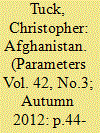

|
|
|
|
|
| Publication |
2012.
|
| Summary/Abstract |
Why has ending the war in Afghanistan proved to be so problematic? In
theory, the decision to end a war should be relatively straightforward.
One or more of the belligerents determine whether or not it is worth continuing the conflict and, as long as at least one of them decides that continuing to
fight is not worth the investment, peace is offered and the conflict terminates.
Clausewitz encapsulates this rational, commonsense approach to the ending
of war when he asserts: "Once the expenditure of effort exceeds the value of
the political object, the object must be renounced and peace must follow."1
By
this logic, and in the context of Afghanistan, the strategic dilemma associated
with how and when to end the war could have been avoided by engaging in a
rational cost-benefit analysis: how much has the war cost and what is the value
of the objectives we were pursuing? Once the former exceeded the latter, then
the Coalition should have struck a deal with the Taliban and left Afghanistan.
Instinctively, of course, we know that the decisions involved in ending a war
cannot be as simple as this rational cost-benefit analysis. But, why is that so?
|
|
|
|
|
|
|
|
|
|
|
|
|
|
|
|
| 2 |
ID:
082243


|
|
|
|
|
| Publication |
2008.
|
| Summary/Abstract |
The debates on the pace, scope and nature of Ottoman military reform tend to be dominated by domestic and/or cultural explanations. Issues of military competition and efficiency, embodied in Neorealist perspectives, might appear to have little to offer as an explanatory tool in the Ottoman context. This article argues that this view is mistaken. First, despite their value, there remains an indeterminacy about domestic and cultural explanations that limits their usefulness as single-cause explanations. Second, Neorealism does generate valuable insights into the dynamics of military reform in the Ottoman Empire; issues of military competition and efficiency do matter in explaining the nature of Ottoman military reform during this period. Ultimately, domestic, cultural, and Neorealist perspectives are complementary, and mono-causal explanations of eighteenth century developments in the Ottoman military are likely to be too simplistic
|
|
|
|
|
|
|
|
|
|
|
|
|
|
|
|
| 3 |
ID:
057717
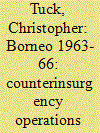

|
|
|
| 4 |
ID:
096511
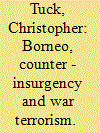

|
|
|
| 5 |
ID:
057922
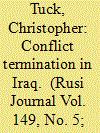

|
|
|
| 6 |
ID:
121544


|
|
|
|
|
| Publication |
2013.
|
| Summary/Abstract |
In 1966, Britain triumphed in a little-known low-intensity war against Indonesia. Orthodox assessments of what was known as the "Confrontation" have lionised British achievements during the campaign, especially the role played by Operation Claret: a campaign of secret, deniable cross-border operations. This article argues that, in fact, British deniable operations were extremely problematic and, indeed, increasingly unpopular with senior military officers. The argument highlights, in particular, the re-occurrence of a perennial problem in the use of military force: the difficulty in measuring during campaigns the extent to which tactical- and operational-level military successes actually translate into strategic political success.
|
|
|
|
|
|
|
|
|
|
|
|
|
|
|
|
| 7 |
ID:
148046
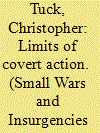

|
|
|
|
|
| Summary/Abstract |
This article evaluates the performance of the Special Air Service (SAS) during secret cross-border raids conducted as part of Britain’s undeclared war against Indonesia from 1963–1966. The analysis reviews the existing debate on the SAS’ performance during this campaign; it looks more closely at how military effectiveness might be defined; and it then examines, using the SAS’ own operations reports, the nature of their activities and their success or failure. This article concludes that critics of the SAS’ effectiveness during Confrontation are right; but for the wrong reasons. SAS operations did indeed have less effect than orthodox accounts would have it. But the reasons for this lay not in their misuse but in the exigencies of British strategy. This article demonstrates an enduring truth – no matter how ‘special’ a military force might be, tactical excellence cannot compensate reliably for problems in strategy.
|
|
|
|
|
|
|
|
|
|
|
|
|
|
|
|
| 8 |
ID:
161013
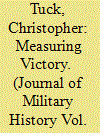

|
|
|
|
|
| Summary/Abstract |
From 1963 to 1966 Britain and Indonesia clashed in a low-intensity conflict known as the Confrontation. Orthodox perspectives have coded this conflict as a tremendous British victory. Revisionist authors have demonstrated the contingent and questionable nature of this conclusion. This article re-assesses the outcomes of Confrontation by using an alternative methodological framework: five key themes drawn from the wider literature on military victory. Using such a lens supports many aspects of the revisionist case, but also shows that the outcomes of Confrontation are even more complex. Confrontation in fact provides an object lesson in the difficulties in assessing categorically the outcomes of war. As such, its importance to our understanding of the problems in defining victory in war has been greatly under-valued.
|
|
|
|
|
|
|
|
|
|
|
|
|
|
|
|
| 9 |
ID:
078707


|
|
|
| 10 |
ID:
191051
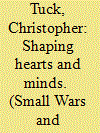

|
|
|
|
|
| Summary/Abstract |
For Western militaries, the choice between enemy-centric and population-centric approaches to unconventional warfare is really no choice at all. Contemporary counterinsurgency doctrines are clear on the decisive importance of hearts and minds in delivering success: in these conflicts, the population is the prize. As this article identifies, however, context may limit in important ways the relevance of many hearts and minds activities. Despite the scale of Commonwealth military success against Indonesia during Operation Claret in 1965–66, and despite the declared importance of hearts and mind activities in support of this success, the specific context that existed during the campaign limited the extent to which hearts and minds could exert a decisive impact. In particular, the limited nature of Commonwealth objectives, which did not seek to change the political ownership of the border area, meant that the local population could not, in the long term, be protected from the consequences of choosing to side with Commonwealth forces. Therefore, despite often being well disposed to Commonwealth troops, rational concerns for their own well-being limited the willingness of border villagers to provide overt help.
|
|
|
|
|
|
|
|
|
|
|
|
|
|
|
|
| 11 |
ID:
171679


|
|
|
|
|
| Summary/Abstract |
The war in the east of Ukraine is now in its sixth year, and despite the cost-benefit logic for both sides of securing a peace, the chances of terminating this conflict remain remote. Using the theoretical literature on war termination, this article demonstrates that the problems of resolving the conflict in the Donbas lie in complex structural issues that are not easy to resolve. To make this argument, this article examines the problems of bringing the conflict to an end by framing the problems according to four key questions: Is war working for the belligerents; Is there a peace to be made; Is peace too costly; Can the war be stopped?
|
|
|
|
|
|
|
|
|
|
|
|
|
|
|
|
|
|
|
|
|